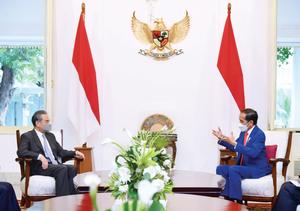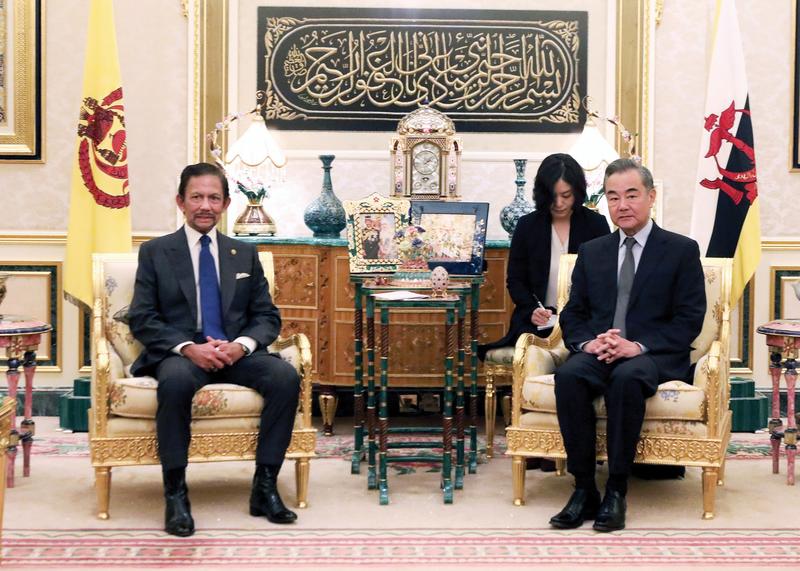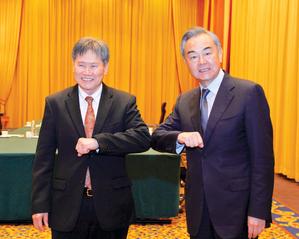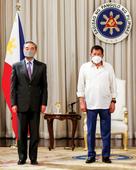 Visiting Chinese State Councilor and Foreign Minister Wang Yi is greeted by Indonesian President Joko Widodo in Jakarta on Jan 13. (PHOTO / XINHUA)
Visiting Chinese State Councilor and Foreign Minister Wang Yi is greeted by Indonesian President Joko Widodo in Jakarta on Jan 13. (PHOTO / XINHUA)
China’s State Councilor and Foreign Minister Wang Yi rounded-up his six-day Southeast Asian tour last week with pledges to donate vaccines, preserve regional stability and promote economic recovery.
Wang visited Brunei, Indonesia, Myanmar and the Philippines from Jan 11 to Jan 16, at a time that these countries are in the midst of battling COVID-19 infections while trying to revive their respective economies.
Analysts said the commitments made by Wang during his official visit will further deepen China’s economic and diplomatic ties with the Southeast Asian region.
This year also marks the 30th anniversary of dialogue relations between China and the Association of Southeast Asian Nations. Wang said ASEAN’s relationship with China is the most dynamic and fruitful of its ties with various dialogue partners and has become an important pillar of regional peace, stability, development and prosperity. Wang said China supports ASEAN’s centrality in regional cooperation and called on the countries to be vigilant against any attempt to diminish the 10-member bloc’s key role in the region.
Lucio Blanco Pitlo III, research fellow at the Manila-based foreign policy think-tank Asia-Pacific Pathways to Progress Foundation, said Wang’s visit to Myanmar (the country coordinator for ASEAN-China relations) and Brunei (this year’s ASEAN chairman) “shows the importance attached by China to the regional body and to the management of outstanding issues with its neighbors”.
 Brunei’s Sultan Haji Hassanal Bolkiah in Bandar Seri Begawan, capital of Brunei, on Jan 14. (PHOTO / XINHUA)
Brunei’s Sultan Haji Hassanal Bolkiah in Bandar Seri Begawan, capital of Brunei, on Jan 14. (PHOTO / XINHUA)
Rene Pattiradjawane, chairman of the Jakarta-based Center for Chinese Studies, said China’s relations with ASEAN are “very dynamic and fluid”.
He said Wang’s visit “amplified the close relations” between the two and this is especially significant now as they share the same concerns: how to control the spread of COVID-19 and cope with its impact.
Indonesia’s state-owned pharmaceutical firm Bio Farma and China’s Sinovac Biotech conducted clinical trials of CoronaVac — one of the World Health Organization-recognized vaccine candidates against COVID-19. The Indonesian Food and Drug Authority, or BPOM, gave emergency-use approval to CoronaVac, with BPOM Chief Penny Lukito noting that the vaccine met WHO’s safety standards.
On Jan 13, Indonesia launched its massive COVID-19 vaccination drive with President Joko Widodo receiving the first shot of CoronaVac.
In his joint press briefing with Indonesian Foreign Minister Retno Marsudi, Wang said vaccine cooperation is a new highlight in China-Indonesia relations and shows the brotherly friendship between the two peoples. “China is willing to work with Indonesia to promote cooperation in the research and development, procurement and production of COVID-19 vaccines,” he said.
Wang also emphasized vaccine cooperation in his visits to other ASEAN countries and how Chinese-made COVID-19 vaccines can lead a worldwide recovery. He said China would donate vaccines to Myanmar and the Philippines, and would also strengthen cooperation on vaccine procurement and use with Brunei.
 Secretary-General of the Association of Southeast Asian Nations Lim Jock Hoi in Bandar Seri Begawan. (PHOTO / XINHUA)
Secretary-General of the Association of Southeast Asian Nations Lim Jock Hoi in Bandar Seri Begawan. (PHOTO / XINHUA)
Analysts said Wang’s four-country visit has also shown how China remains fully invested in the region, helping these countries to rebound from last year’s recession.
“China has significant trade and investments in these countries. Relations have also been extremely good, so this visit is geared towards reinforcing relations,” said Jatswan Singh, executive director, Asia-Europe Institute at the University of Malaya in Kuala Lumpur.
Pitlo of the Asia-Pacific Pathways said Wang’s visit reinforces China’s commitment to the national connectivity projects of ASEAN countries even amid a pandemic.
He cited Wang’s visit to the Philippines, where the itinerary included the signing of a 500 million yuan (US$77.31 million) grant for Philippine infrastructure projects.
Wang said China is willing to further link the Belt and Road Initiative with ‘Build Build Build’ — the Philippines’ flagship infrastructure development program.
Wang has also focused on infrastructure development and economic cooperation in his visits to Brunei, Indonesia and Myanmar.
He said China and Brunei are celebrating the 30th anniversary of diplomatic relations this year and to this end called on both sides to fully implement the consensus reached by leaders of the two countries and align China’s Long-Range Objectives Through the Year 2035 with Brunei’s national socioeconomic development plan Wawasan 2035.
 Philippine President Rodrigo Duterte in Manila on Jan 16. (PHOTO / XINHUA)
Philippine President Rodrigo Duterte in Manila on Jan 16. (PHOTO / XINHUA)
In Indonesia, Wang said the purpose of his visit is to implement the consensus reached by Chinese President Xi Jinping and President Widodo to deepen cooperation. The two leaders have agreed to set up “three models” for emerging major countries and South-South cooperation: a model of vaccine cooperation, a model of joint construction of the Belt and Road Initiative, and a model of safeguarding multilateralism.
A memorandum of understanding on cybersecurity capacity building and technical cooperation and an MOU on “Two Countries, Twin Parks” — where China and Indonesia aim to build interconnected businesses through industrial estates — were signed during Wang’s visit.
In Myanmar, where the ruling National League for Democracy party won a fresh mandate in the November elections, Wang said China supports the new government in revitalizing its economy, improving people’s well-being, and accelerating industrialization.
Wang hopes that China and Myanmar would effectively implement the agreement on the China-Myanmar Economic Corridor. The CMEC will connect Southwest China’s Yunnan province to the Myanmar cities of Mandalay, the country’s biggest city Yangon, and the Kyaukpyu Special Economic Zone in Rakhine state.
He concluded the ASEAN tour with a visit to Manila where he discussed the South China Sea issue with Philippine Foreign Affairs Secretary Teodoro Locsin, Jr.
Wang said that China is willing to speed up consultations with ASEAN countries on the Code of Conduct in the South China Sea and to ensure that the set of rules can show the world that participating countries have the ability and wisdom to jointly solve the region’s existing issues.


